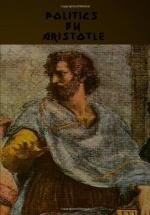
|
| Name: _________________________ | Period: ___________________ |
This test consists of 15 multiple choice questions and 5 short answer questions.
Multiple Choice Questions
1. Aristotle says that changing the economics of a state means that what has to change?
(a) Political elite.
(b) Constitution.
(c) Government.
(d) Rule of law.
2. Aristotle believes that ensuring the division and inheritance of estates is a way to control wealth and what?
(a) Oligarchies.
(b) Population.
(c) Influence.
(d) Monarchies.
3. Aristotle advocates development of the spiritual character virtues within every individual as a means to what?
(a) Educate the people.
(b) Create a sense of virtue.
(c) Further the state.
(d) Instill pride.
4. Aristotle says that there can be problems when more of the citizens are attracted to profit than to what?
(a) Desire.
(b) People.
(c) Honor.
(d) Politics.
5. Aristotle thinks that the constitution of the Lacedaemonians is what?
(a) Mediocre.
(b) Popular.
(c) Balanced.
(d) Well thought out.
6. Aristotle says that those greatest in virtue, regardless of all else, should do what?
(a) Rule.
(b) Be the rich.
(c) Learn to be leaders.
(d) Be judges.
7. Aristotle says that when the people are close to equal, the education system needs to be designed so that the ruled can do what?
(a) Develop a sense of civic duty.
(b) Develop into rulers.
(c) Develop their talents.
(d) Develop into military men.
8. Reason, habituation, and what, form a triplicate of forces available to every man?
(a) Listening.
(b) Speaking.
(c) Writing.
(d) Thinking.
9. Aristotle says that the Lacedaemonians have a form of communal care for the young, which is called what?
(a) Child care.
(b) Public raising.
(c) Public education.
(d) Child rearing.
10. According to Aristotle, music can contribute to the development of what?
(a) Selflessness.
(b) Discipline.
(c) Character.
(d) Ideals.
11. Aristotle urges that kingship be granted on virtues of birth and what?
(a) Merit.
(b) Service.
(c) Knowledge.
(d) Social status.
12. The Greeks called physical training what?
(a) Gymnastics.
(b) Rituals.
(c) Workouts.
(d) Wrestling.
13. Aristotle believes that in an oligarchy, the oligarchs come from where?
(a) The wealthy.
(b) The poor.
(c) The aristocracy.
(d) The middle-class.
14. For Aristotle, what is one of the strongest signs of social and political liberty?
(a) Participation in voting.
(b) Participation in public life.
(c) Taking turns at ruling.
(d) Taking a public office.
15. Aristotle says that a ______ state will have everyone recognizing that it is in his best interests to work with the state.
(a) Healthy.
(b) Democratic.
(c) Unified.
(d) Polity.
Short Answer Questions
1. Aristotle says that a government will have problems when more of its people are interested in profit than in what?
2. A system of what, according to Aristotle, is intended to help society reflect the government?
3. Dionysus of Syracuse ruled on what island?
4. Aristotle believes that what resources is important to the location, protection, and defense of the city?
5. Aristotle says that a professional musician is like a what?
|
This section contains 422 words (approx. 2 pages at 300 words per page) |

|




